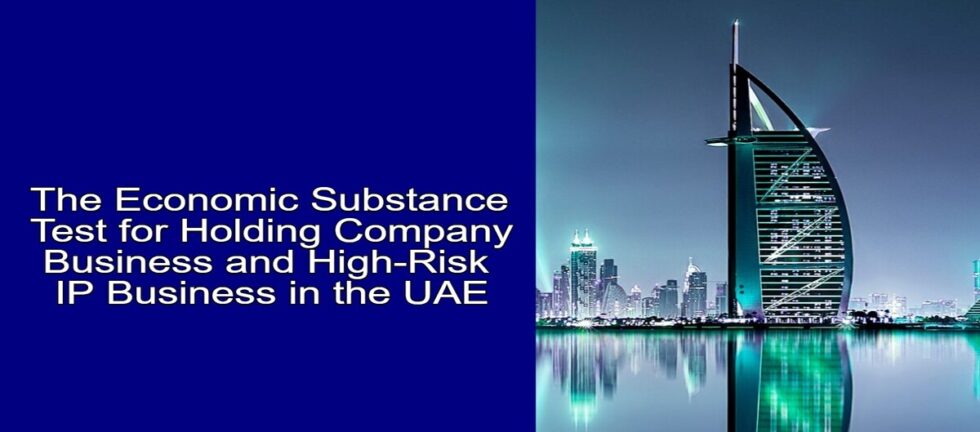The UAE issued economic substance regulations (the “Regulations”) in April 2019, amended by Cabinet Resolution No.57 of 2020 in August 2020, which introduced a requirement for UAE entities to maintain an adequate “economic presence” in the UAE relative to the activities they undertake.
The UAE economic substance requirements apply to all UAE onshore and free zone companies and certain other business forms that undertake one or more “Relevant Activity” for financial years commencing on or after 1 January 2019.
WHAT ARE THE RELEVANT ACTIVITIES?
The Regulations apply to Licensees that carry out any of the following Relevant Activities.
- Banking Businesses
- Insurance Businesses
- Investment Fund Management Businesses
- Lease-Finance Businesses
- Headquarter Businesses
- Shipping Businesses
- Holding Company Businesses
- Intellectual Property Businesses
- Distribution and Service center Businesses
WHAT REQUIREMENTS DO UAE ENTITIES NEED TO MEET?
General Economic Substance Test
For each financial period in which a Licensee earns income from a Relevant Activity, it will need to meet an Economic Substance Test in relation to that activity.
The Economic Substance Test requires a Licensee to demonstrating that:
- The Licensee and Relevant Activity are being directed and managed in the UAE;
- The relevant Core Income Generating Activities (CIGAS) are being conducted in the UAE; and
- The Licensee has adequate people, premises and expenditure in the UAE.
The UAE acknowledges that businesses vary in size and nature, and what is adequate and appropriate will depend on the nature and level of activities carried out, and the level of income earned by the Licensee. The Regulations therefore do not provide a “minimum” standard for what is considered “adequate” or “appropriate”.
The FTA is expected to take a pragmatic approach when assessing whether a Licensee has met the Economic Substance Test, recognizing that the type and level of activity of a Licensee may fluctuate during the course of a financial period and from year to year.
Different economic substance requirements apply depending on the Relevant Activity carried on. For example, holding companies are subject to less stringent economic substance requirements, but additional economic substance requirements apply to ‘high risk’ IP related activities.
ECONOMIC SUBSTANCE TEST FOR HOLDING COMPANY BUSINESS
Under the ES regulations, holding company business is defined as a business which:
- Only holds equity in other companies or entities; and
- Only earns dividends and capital gains as income.
An entity that holds other kinds of assets or earns other kinds of income is not considered a holding company business under ES regulations.
A holding company business must satisfy the following reduced test:
- It complies with all the existing compliance requirements under the applicable regulations; and
- It has adequate employees and physical assets to perform the activity.
- It is not required to demonstrate adequate expenditure and management control in the UAE.
ECONOMIC SUBSTANCE TEST FOR HIGH-RISK IP BUSINESS
All of the following conditions must be met for an IP Business to be considered as “High Risk”:
- The Licensee did not create the IP asset which it holds for the purposes of its business;
- The Licensee acquired the IP asset either from:
- a Connected Person, or
- in consideration for funding research and development by another person situated in a country other than the UAE;
- The Licensee:
- licenses the IP asset to one or more Connected Persons, or
- otherwise generates income from the asset in consequence of activities performed by Foreign Connected Persons
When an intellectual property (IP) business is considered high-risk, it is subject to a stricter test.
A high-risk IP business must satisfy the general test at first, and further meet the following requirements:
- It has a high degree of control over the development, exploitation, maintenance, protection, and enhancement of the IP Asset; and
- It has to submit additional proof and documents.
The documents must demonstrate that:
- The licensee has adequate full-time employees with the necessary qualifications who permanently reside and perform their activities in the UAE;
- It has a business plan showing the reasons for holding the IP in the UAE; and
- Relevant decision-making has taken place in the UAE.
WHAT ARE THE PENALTIES FOR NON-COMPLIANCE?
Failure to submit a Notification: AED 20k
Failure to submit an Economic Substance Report:
- Penalty of AED 50k; and
- Deemed failure to demonstrate economic substance in the UAE
Failure to provide accurate or complete information:
- Penalty of AED 50k; and
- Deemed failure to demonstrate economic substance in the UAE
Failure to demonstrate sufficient economic substance in the UAE for the relevant Financial Year:
First failure
- Penalty of AED 50k; and
- Information exchange with foreign competent authority of:
- parent company,
- ultimate parent company, and
- ultimate beneficial owner
Second consecutive instance of failure
- Information exchange with foreign competent authority of:
- parent company,
- ultimate parent company, and
- ultimate beneficial owner; and
- Penalty of AED 400k; and
- Trade / commercial license could be suspended, withdrawn or not renewed
The Ministry of Finance has already started issuing heavy fines for companies which are not compliant with the regulations. In applying these fines, the Ministry of Finance will apply the Economic Substance Test set out in Article 6 of the ESR.
WHAT SHOULD A LICENSEE CONSIDER BEFORE THE END OF A FINANCIAL PERIOD?
The following is meant as a non-exhaustive list of matters a Licensee should consider (and action, where relevant) before the end of a financial period:
- Assess what (if any) Relevant Activities it has performed during the financial period (applying a “substance over form” approach).
- Assess the amount and type of income earned (if any) from the Relevant Activity during the financial period.
- Hold board meetings with a quorum of directors physically present in the UAE.
- Ensure board meeting minutes are signed and maintained in the UAE.
- Identify the amount and type of expenses and UAE based assets (incl. premises) in respect of the Relevant Activity, and ensure access to assets (incl. premises) can be demonstrated (through agreements and financial records)
- Identify the number of UAE based full-time employees or other personnel (and their qualifications) responsible for carrying on the Licensee’s Relevant Activity; and
- Ensure control and supervision over any outsourcing arrangements can be demonstrated, e.g., through contractual agreements.
- Additional actions may be required to ensure a Licensee can demonstrate sufficient economic substance in the UAE for a relevant financial period, and the considerations above may differ where a Licensee has either a Holding Company or a High-Risk IP Business.
ESR COMPLIANCE SERVICES
Ahmad Alagbari Chartered Accountants experts can help you by providing following services
- ESR Test / Assessment
- Review of ESR compliance and identify any gaps
- Timely submission of Notification
- Submission of ESR Report
- Appeals

Alia Noor (FCMA, CIMA, MBA, GCC VAT Comp Dip, Oxford fintech programme, COSO Framework)
Associate PartnerAhmad Alagbari Chartered Accountants






